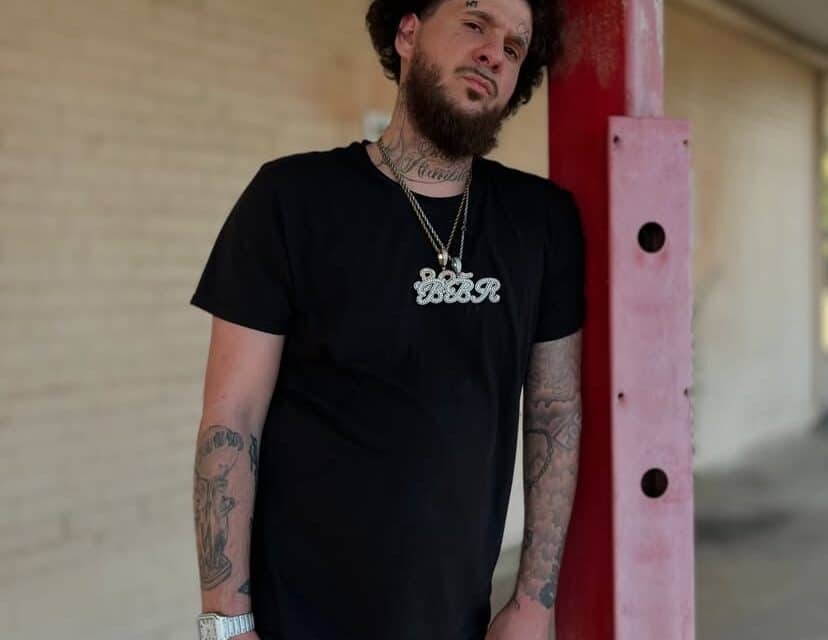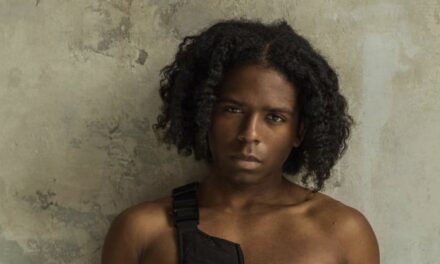Some stories are written in studio lights, others in sweat and grit. For Gavin Copeland, a Louisiana-born and Texas-raised rising soul singer, music wasn’t the obvious path—it was the one whispered by life’s struggles, long before he had the courage to follow it.
Growing up splitting time between his family’s bakery and his grandmother’s house, Gavin learned early that stability isn’t guaranteed. He dreamed first of the basketball court, then flirted with rap, before a chance nudge from his girlfriend—and a Teddy Swims type beat—set him on a new path. The result? His viral single “Make a Million”, a soulful, from-the-heart freestyle that resonated with millions on TikTok.
With tattoos on his face and a voice that blends Southern soul with modern grit, he’s on a mission: to make music that heals, uplifts, and speaks for anyone who’s been judged or underestimated.
We sat down with Gavin to talk about his journey, his creative circle, and why he wants his music to carry more than just melody—it carries his testimony.
Take us back. How did “Make a Million” come to life?
Honestly, it happened in the simplest and most unexpected way. For a long time, I was trying to make rap work. I had some traction, but it wasn’t giving me that spark anymore. I was starting to feel stuck—frustrated with the grind, paying bills, wondering if my dream was slipping away. My girl was the one who said, “Why don’t you sing instead of rap this time?”
I had been listening to Teddy Swims’ “Lose Control” on repeat, so I pulled up a beat in that style. I didn’t overthink it—I just pressed record and let everything I’d been carrying come out. I was thinking about the weight of life, the struggle of coming up, and that burning desire to make a better life for myself and my family. The words “I want to make a million” just came out naturally. It wasn’t about being flashy—it was about escaping the struggle, feeling free for once. That freestyle became “Make a Million,” and when I posted it to TikTok, I had no idea my whole life was about to change.
When that video went viral, how did life change for you?
It felt like my world flipped overnight. I went from being a guy grinding in silence to having people recognize me in public. I’ve always been an introvert—I’m more comfortable in my room, writing or recording—but suddenly strangers were walking up to me saying, “Aren’t you the guy who sings ‘Make a Million’?”
The wildest part is that TikTok wasn’t even my first viral moment. I started out doing opera videos after my brother passed away. He always told me I should sing, so I did it for him. One of those videos got over three million views, and that gave me the confidence to keep going. But this felt different. This time, people weren’t just watching—they were connecting to my story. Seeing that love, after years of doubt and struggle, felt like God was finally saying, “Keep going. This is your purpose.”
Growing up in Louisiana, what was your childhood like?
My childhood was complicated—it wasn’t terrible, but it wasn’t easy either. My parents worked hard; they ran a small bakery, and we were always trying to make ends meet. Sometimes we even slept on the bakery floor because they couldn’t afford a babysitter. That was normal life for us.
I spent a lot of time with my grandma or just by myself. I was a quiet, introverted kid who lived in my own world. And Louisiana… it has this energy. People say it’s haunted, and honestly, I believe it. I’d hear voices, see shadows on the wall—stuff that would scare most kids—but I always felt protected by God. I think that mix of isolation, imagination, and mystery gave me a deep inner world to pull from later in my music.
Moving to Texas as a teenager brought a new kind of reality. That’s where I really saw street life, poverty, and the way people get judged for their appearance or their past. All of that lives in my music now. My songs are like a diary of everything I’ve seen and felt.
Your music feels deeply personal. What are you trying to communicate through your songs?
I want my music to be a voice for people who feel invisible. I’ve been that person—judged for my tattoos, my past, or just my dreams. A lot of people look at someone like me and assume we won’t amount to anything.
With “Make a Million,” I wasn’t just talking about money. I was talking about freedom. About wanting to break out of the cycle of struggle and give my son a better life. I also wanted to make something that people from all walks of life could feel—whether they’re hustling in the streets, working two jobs, or just trying to make it through another day.
Music is my way of healing, and I hope when people hear my songs, they feel less alone.
Who are the artists or sounds that influence your style today?
My influences are all over the place. First, I give all glory to God—without Him, I wouldn’t have made it here. My son also inspires me because everything I do now is for him.
Musically, I grew up idolizing Lil Wayne and Eminem. Being from Louisiana, Wayne was like a hometown hero—you couldn’t escape his impact. Eminem showed me that music could be raw and vulnerable, that pain could turn into power.
Today, I love artists like Teddy Swims because he’s bringing soul into modern music. I feel like soul and blues have been pushed aside, and I want to help bring them back—but with my own twist. I want to take that old-school feeling and wrap it in a sound people can vibe to right now.
You’ve built a creative family with Trey Webb and Dre Brennan. What’s that collaboration like?
That’s deeper than music—that’s brotherhood. I met Trey in high school, and we didn’t even like each other at first. Years later, life threw us together in the studio, and we realized we were cut from the same cloth.
We’ve been through real-life struggles together—nights with no food, moments where danger felt close, even witnessing violence. Those experiences built a bond that’s unbreakable. Trey is now my manager and one of the people who helped me find my singing voice. Dre is like family too. When we make music, it doesn’t feel like work; it feels like therapy with people I trust completely. That energy is what people feel when they hear the songs.
What’s next for you and your music?
Right now, I’m focused on growing as an artist and staying consistent. My next single, “Love or Lust,” drops August 1, and it’s another soulful track. But I never want to be boxed in. One day I might drop a blues song, the next day a rap record, and after that something emotional that makes people cry.
My mission is bigger than just making hits. I want to heal people with my music, bring them closer to love, and even closer to God. This world feels dark sometimes, and I want my songs to be a little bit of light for whoever needs it.
Last question—what do you want to say to someone who’s in the same position you once were?
I’d tell them: never let anyone decide your future for you. Family, friends, strangers—people will try to put their limits on you, but those limits aren’t real. Trust God, stay focused, and don’t give up even when it feels impossible.
And if you’re struggling—whether it’s poverty, grief, or depression—you can make it out. But you have to take that first step. Sitting in the pain won’t change anything. Spread love, keep your faith, and work like your life depends on it—because in a way, it does. Nothing is impossible if you believe and put in the work.





